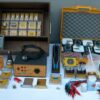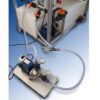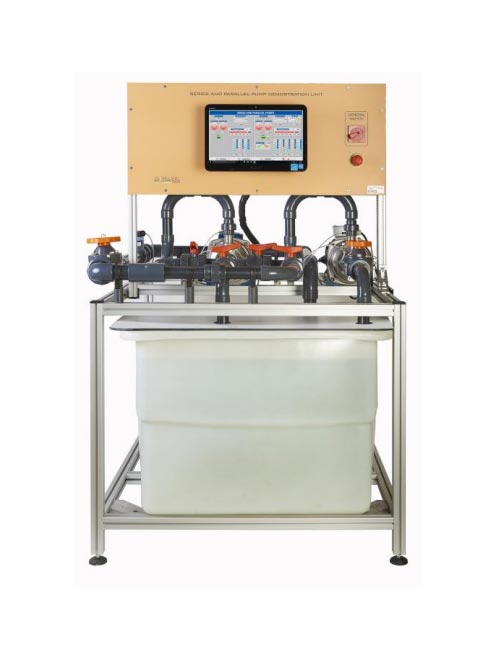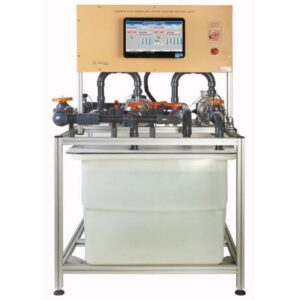TRAINING OBJECTIVES
• Start up of a pump, analysis and study of related aspects.
• Pump priming.
• Checking the direction of rotation
• Over current produced in the pump motor.
• Study and obtaining of the characteristic curves of a pump:
– Height – flow (H-Q)
– Power – flow (P-Q)
– Performance – flow (ƞ-Q)
– Mechanical power – flow (Pm-Q)
– Motor performance – flow (ƞe -Q)
– Electric power– flow (Pe -Q)
– Total performance – flow (ƞ -Q)
• Study of cavitation and obtaining the characteristic curves of NPSH required flow.
• Study of different ways to regulate a pump.
Checking affinity laws.
• Variation of pump rotational speed and obtaining new curves.
• Changing the operating point varying the pumping installation.
• Adjusting the discharge valve • Bypass usage
• Analysis of similar pumps and different pumps running in group
• Characteristic curves : in-series operation.
– Height – flow ( H- Q)
– Power – Flow (P- Q)
– Performance – Flow (ƞ – Q)
• Characteristic curves: in- parallel operation.
– Height – flow (H- Q)
– Power – Flow (P- Q)
– Performance – Flow (ƞ – Q)
TECHNICAL DATA
Inner diameter:
• Suction piping
– Inner Ø = 45.2mm
– Outer Ø = 50mm
• Discharge piping
– Inner Ø = 34mm
– Outer Ø = 40mm
Tank:
• Capacity : 250 liters
Manometers:
• Electric pressure by transducer –1 a 7 bar // -10.33 M WC to 70 M WC
• Electric pressure by transducer –1 a 4 bar // -10.33 M WC to 40 M WC (x3)
Pump features:
• Maximum manometric head: 23 M WC
• Maximum flow rate: 160l/min at 10 M WC
• Power consumption: 750W
• Motor speed: 2.900rpm
Other elements:
• Electronic flow meter
• Load cell : 5 Kgs
• Wattmeter: 0-1200W
• Frequency inverter
• Computerized system with data acquisition with software(integrated computer with touch screen)
SERIES AND PARALLEL PUMP – DEMONSTRATION UNIT
This trainer has been designed in order to practice many of the steps involved in the start up, operation phases and necessary regulation in a pump installation.
One of the pumps of the system is controlled by a variable frequency drive, which allows the variation of the rotation speed.
The flow rate is measured by electronic flowmeter. In addition, it is possible to analyze the characteristics of different types of pumps such as a single operating, in group, in series or in parallel configuration performing a wide range of practices and tests.
Pumps are controlled by an inverter, so speeds can be changed and monitored by flow meter.
All control and parameter readings are done by a computer included in the unit, which has automatic or manual data capture.
A test can be programmed and the computer can operate automatically modifying the parameters and capturing data.
















